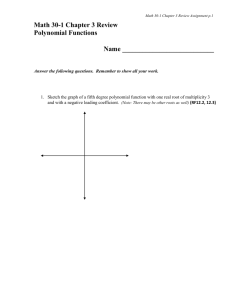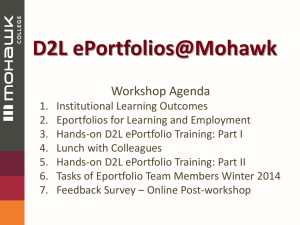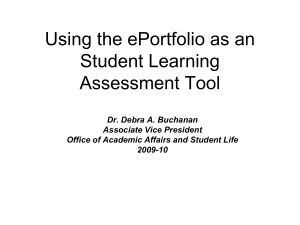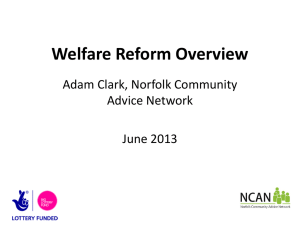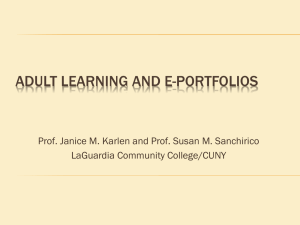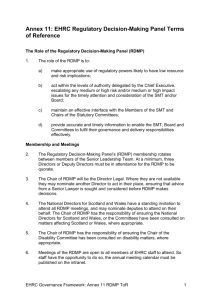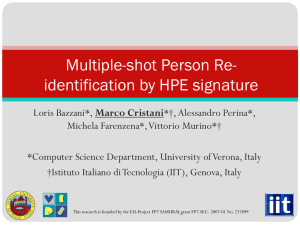The traffic light system
advertisement
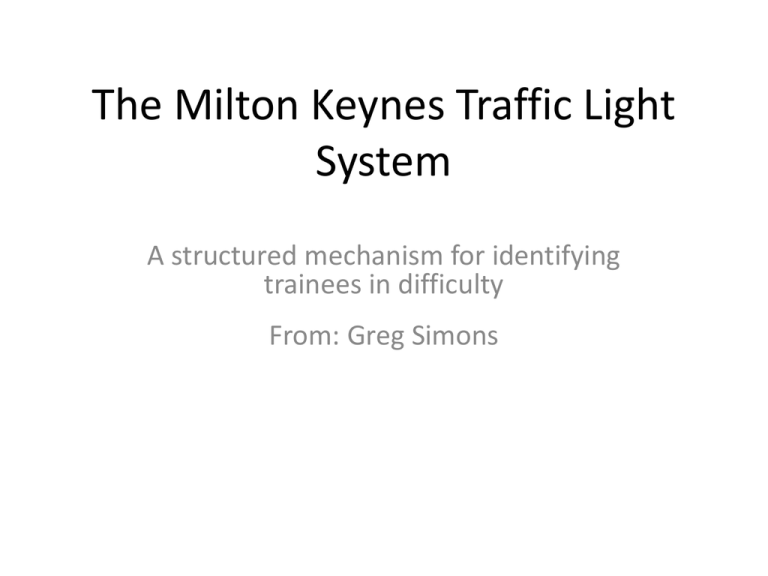
The Milton Keynes Traffic Light System A structured mechanism for identifying trainees in difficulty From: Greg Simons Overview of Presentation • • • • • • Introduction RDMp Model Reflection/ Insight Traffic Light system Implications of the traffic light Expectations Introduction • GP • GP Trainer • National Clinical Lead GP access and responsiveness • Associate GP Dean – PD support – Trainer Support – Trainee Support – Executive rep at Deanery Board level – Faculty Development The RDM-p Model • Tim Norfolk – Quality in Primary Care 2009 17 (1), pp37-49 • Unifying theory of clinical practice • Links Relationship, Diagnostics, Management and Professionalism • Overarching model, provides a framework that can incorporates criteria and competencies across the range of assessments of a GP's work RDMp Relationships descriptor descriptor R=relationships Negative positive •Holistic •Consulting skills •Communicating •Working with colleagues •Lacks warmth in voice/manner •uses too many closed questions •Unable to adapt language •Unclear when communicating •Gives little support •confrontational (+p) •Authoritarian (+p) •Good non verbal behaviour •Uses open questions •Adjusts questioning •Expresses ideas clearly •Encourages contribution •Delegates appropriately •Non-judgemental Adapted from Tim Norfolk; Quality in Primary Care 2009 RDMp Diagnostics descriptor descriptor D=Diagnostics negative positive •Data gathering •Data interpretation •Making diagnoses •Making decisions •Clinical Management •Managing complexity •Can’t find a way of resolving the problem (D+M) •Makes immediate assumptions •Dogmatic •Overlooks important information •Options too limited •Positive when dealing with problems •Thinks around issues •Open to new ideas •Shows interest and understanding •Identifies key points •Aware of options Adapted from Tim Norfolk, Quality in Primary Care 2009 RDMp Management descriptor descriptor M= management negative positive •Community orientation •Practice Management •IMT •Maintaining performance •Learning and teaching •Unsystematic •Fails to apply lessons •Disorganised •Doesn't keep up to date •Poor prioritisation •Misses reasonable deadlines •Doesn't think ahead •Doesn't cope well with unexpected •Becomes agitated •Sound systematic judgement •Admits to and learns from mistakes •Organised •Regularly updates job related skills •Prioritises effectively •Coordinates activity •Thinks ahead •Delivers on time •Stays calm under pressure adapted from Tim Norfolk, Quality in primary care 2009 RDMp professionalism descriptor descriptor P= professionalism negative positive •Ethics •Fitness to practice •Defensive (M+P) •Critical •Shows favouritism •Narrow perspective •Fails to take responsibility for poor actions •Treat issues as problems •Disrespectful to colleagues, staff or patients •Finds it difficult to seek help when appropriate •Receptive •Gives constructive feedback and support •Collaborates •Sees bigger picture •Takes responsibility appropriately •Recognises limitations •Shows respect •Seeks help when necessary Adapted from Tim Norfolk, Quality in primary care 2009 RELATIONSHIP DIAGNOSTICS Practising Holistically Data Gathering & Interpretation Communication & Consulting Skills Making a Diagnosis / Making decisions professionalism Working with Colleagues & in Teams Maintaining an Ethical Approach to Practice Fitness to Practise Clinical Management Managing Medical Complexity Community Orientation Primary Care Administration & IMT Maintaining Performance, Learning & Teaching MANAGEMENT © Tim Norfolk Tim Norfolk Quality in Primary Care 2009, 17 (1), pp37–49 RDMp and Good Medical Practice Tim Norfolk 2009 Insight/ Reflection Amar Rughani’s Insight Table Performa Insight nce Reflect What do you think?? Good Good •Ideal Good Poor •Unconsciously competent doctors may not adapt to changing situations as they don't understand why they are (currently) competent. They may also engage in risky practices through lack of insight regarding the connection between action and effects. Poor Good •Consciously incompetent doctors might be difficult because they have low motivation to improve. The causes of low motivation, such as stress need to be looked for. Poor Poor •Unconsciously incompetent doctors may be the most difficult to remediate because despite regular exposure to deficiencies in performance, they may lack the capacity to change Using the Traffic Light System • Look at descriptors for RDMp domains • Apply the grading in each domain using your knowledge of the trainee, experience and evidence e.g. eportfolio, feedback Grading (Milton Keynes) • • • • • 1 = clearly failing 2 = concerns 3 = expected stage 4 = above expectation for stage 5 = ready for independent practice • Add in insight/lack insight (-/+) Using the Traffic Light System • Look at descriptors for RDMp domains • Apply the grading in each domain using your knowledge of the trainee, experience and evidence e.g. eportfolio, feedback • Decide whether the trainee demonstrates insight with reflective ability with + or • Categorise Green/ Amber/ Red Traffic Light System for MKVTSTables colour concern eportfolio ES PD/AD Green none •Sufficient number and quality of entries. •Progression in PDP and skills log •Satisfactory coverage curriculum •Satisfactory completion Assessments •Continue regular review eportfolio •Continue 6/12ly reviews •RDMp3+ in all areas •Monitor eportfolio Traffic light system for MKVTS colour concern ePortfolio ES PD/AD Amber Some •Consistently poor quality/ number of entries •Poor PDP •Poor coverage of curriculum •Inadequate number of mandatory assessments •RDMp2 in any one area •One area may be (-) for insight PD interviews trainee + ES Traffic light system for MKVTS colour concern ePortfolio ES PD/AD Red Significant •Failure to engage ePortfolio •Unsatisfactory progress signalled by ES or CS •RDMp1/2 in more than one area •poor insight (-) in multiple domains Interview with PD/AD with ES with a view to referral to ARCP Implications of Traffic Light • Feedback monthly for those in GP, Quarterly for those in Hospital (more freq if problems) • Early referral to ARCP • Reflective Skills very important • Early, Frequent and open discussion with Ed Supervisor Expectations • Full engagement • Professionalism • Self Directed
